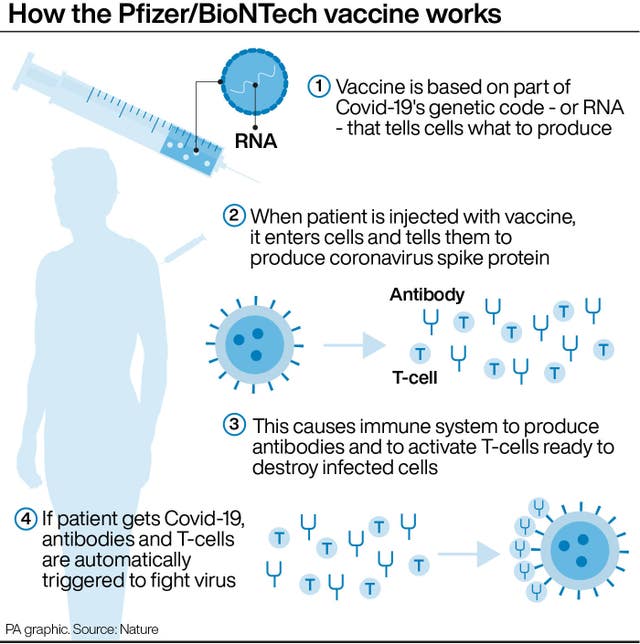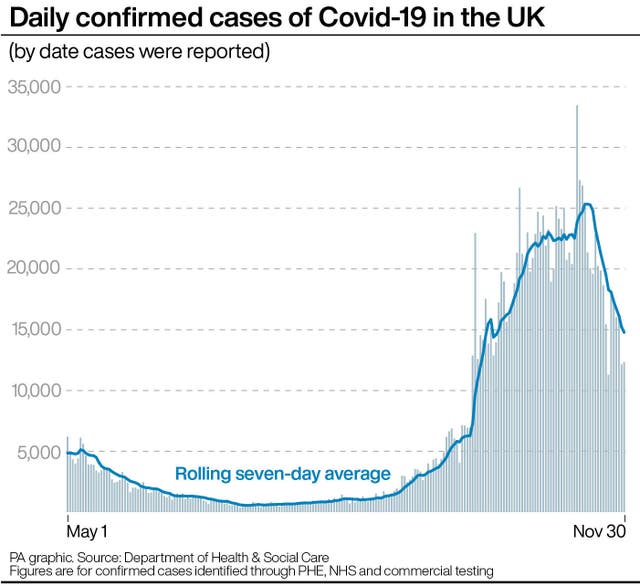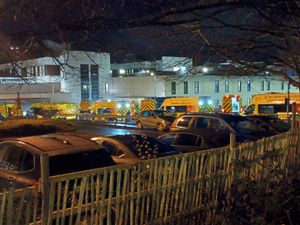Care home residents top the list for newly approved Covid-19 jab
The UK has ordered 40 million doses of the Pfizer vaccine, enough to vaccinate 20 million people with two doses, given 21 days apart.
Elderly people in care homes and their carers are top of the list to receive a Covid-19 vaccine after the UK became the first country in the world to approve a jab from Pfizer and BioNTech.
The jab has been shown in studies to be 95% effective and works in all age groups.
The Joint Committee on Vaccination and Immunisation (JCVI), which advises ministers, said vaccines should first be offered to elderly people in care homes and care home workers.
Next on the priority list are those aged 80 and above and frontline health workers.
All those aged 75 and over should be vaccinated next, followed by those 70 and over and clinically “extremely vulnerable” individuals, it said.
The UK has ordered 40 million doses of the Pfizer vaccine, enough to vaccinate 20 million people with two doses, given 21 days apart.
Health Secretary Matt Hancock said 800,000 doses of the jab will arrive next week, with millions more arriving in the coming weeks.
Studies on the vaccine show it has to be stored at minus 70C but is also stable at 2C to 8C for a short time, meaning it could possibly be sent to different locations.
Labour leader Sir Keir Starmer pressed Boris Johnson at Prime Minister’s Questions about the practicalities of getting the vaccine into care homes.
He said: “What plans has he put in place to address these particular problems of getting the vaccine safely and quickly into care homes, given the practical difficulties of doing so and the anxiety that those in care homes will have about getting it quickly?”
Mr Johnson replied: “It does need to be kept at minus 70C, as I think the House understands, so there are logistical challenges to be overcome to get vulnerable people the access to the vaccine that they need.
“We are working on it with all four devolved administrations in order to ensure that the NHS across the country is able – and it’s the NHS that will be in the lead – to distribute it as fast and as sensibly as possible to the most vulnerable groups.”
Care England, a leading care provider membership group, said it had received no clear communications from the Government but thought it was unlikely that the Pfizer vaccine could be easily distributed in care homes.
However, Sean Marett, chief commercial officer at BioNTech, said otherwise.
He told a briefing: “We have stability studies now really supporting the evidence for being able to transport up to six hours at 2C to 8C degrees, so you can really take vials from the vaccination centre – one of the large ones – put them in a bag at 2C to 8C, and take them to the care homes where they can be administered directly to the patients.”
He added: “If you store the vaccine in a fridge, you can store it for up to five days.
“If you want to take some of those vials out of the fridge containing the vaccine, and ship them to a local care home, then you have to do that within six hours 2C to 8C.”

A Department of Health and Social Care spokesman said the Medicines and Healthcare products Regulatory Agency (MHRA) had approved the jab after “months of rigorous clinical trials and a thorough analysis of the data by experts” from the regulator.
He said they have concluded that the vaccine has “met its strict standards of safety, quality and effectiveness”.
Mr Hancock told Sky News the UK was the first country in the world to have a “clinically authorised vaccine” and it would be deployed as “quickly as it is manufactured”.
He added: “The MHRA, the fiercely independent regulator, has clinically authorised the vaccine for roll out.
“The NHS stands ready to make that happen.
“So, from early next week we will start the programme of vaccinating people against Covid-19 here in this country.”
Mr Hancock said until vaccines were rolled out people needed to stick to the rules, saying: “We’ve got to get from here to there and we’ve got to keep people safe in the meantime.”
There would be “three modes of delivery” of the vaccine, with hospitals, mass vaccination centres and GPs and pharmacists offering the jab to those most in need, he added.
“Fifty hospitals across the country are already set up and waiting to receive the vaccine as soon as it’s approved, so that can now happen.”
Mr Hancock confirmed vaccinations will start with the most elderly, people in care homes and their carers, with NHS staff and the clinically extremely vulnerable also high on the list.
He told BBC Breakfast: “2020 has been just awful and 2021 is going to be better, and help is on its way with this vaccine.
“I’m confident now with the news today that from spring, from Easter onwards, things are going to be better and we’re going to have a summer next year that everybody can enjoy.”

In a Downing Street briefing, Professor Wei Shen Lim from the JCVI explained how care home residents were vulnerable to Covid-19, hence why they are top of the list.
But he added: “Whether or not the vaccine itself can be delivered to care homes is obviously an important point, and there will be some flexibility in terms of operational constraints.
“The JCVI’s advice is that every effort should be made to supply vaccines and offer vaccinations to care home residents, whether or not that is actually doable is dependent on deployment and implementation.”
Dr June Raine, head of the MHRA, said “no corners have been cut” in assessing its safety.
“The safety of the public will always come first,” she said,
“This recommendation has only been given by the MHRA following the most rigorous scientific assessment of every piece of data so that it meets the required strict standards of safety, of effectiveness and of quality.”
Information obtained by the PA news agency on the jab’s roll-out says once the vaccine arrives in the UK from Pfizer’s plant in Belgium, batches will be checked at a central depot to ensure their quality.
The vaccine will then be unloaded and moved to storage freezers where it will undergo an additional temperature check.
Public Health England (PHE) will process orders placed by the NHS for next day delivery to hospital hubs around the UK.
Defrosting the vaccine for use takes several hours and then extra time is needed to prepare the vaccine for administering as doses.
Ben Osborn, Pfizer’s UK country manager, told PA that deliveries were already under way from the Pfizer plant to the UK but said he was not “giving an absolute figure” on how many doses would be delivered to the UK this year.


